
Topics
Colonel Paul Tibbets named his plane the Enola Gay after his mother. He bombed Hiroshima. Captain Kermit Beahan describes the bombing of Nagasaki. [includes rush transcript]
On this eve of the sixtieth anniversay of dropping of the two atomic bombs, we turn to archival government clips of the men who bombed Hiroshima and Nagasaki. These excerpts are from the Atomic Cafe — a 1982 film of compiled U.S. government footage designed to reassure Americans that the atomic bomb was not a threat to their safety.
Related link:
Transcript
JUAN GONZALEZ: On this eve of the 60th anniversary of the dropping of the two atomic bombs, we turn to excerpts from the men who bombed Nagasaki and Hiroshima. This is Paul Tibbets and Captain Kermit Beahan from the film, Atomic Café. This 1982 film compiled government propaganda footage that was designed to reassure Americans that the atomic bomb was not a threat to their safety.
PAUL TIBBETS: I have been accused of being insane, being a drunkard, being everything that you could imagine a derelict to be as a result of a guilty conscience for doing this, and as I say, no one’s ever come to my defense in that regard. I look at it this way, that my part in this thing may well have been something that later or now that the U.S. government might be looking at somewhat with a guilt complex. And the feeling could be that the less said about it by the United States government, the better.
AMY GOODMAN: Paul Tibbets, one of the men who dropped the bomb on Hiroshima and named the plane for his mother, the Enola Gay. He talks about what that flight was like.
PAUL TIBBETS: The Trinity test had been executed in New Mexico. The people from Trinity had arrived in the Marianas, and they had with them, at that particular time, colored photographs of the Trinity explosion. So, we got the gang together, and we showed them. We didn’t use the word “atomic bomb.” We did not use that, but we said, “Okay, now, this is the bomb. This is what will happen when we make our flight tomorrow and release it. This is what we’re going to see.” So, with this preliminary indoctrination, we got into the airplane and took off.
Once we were airborne and in the air, I then left the pilot’s seat of the airplane, and I crawled back into the back where the enlisted men were. I got them all together back there, and we poured some coffee out of the thermos jug, and I told them actually what we were doing and what we were carrying at that time. And the weather being clear at our primary, which was Hiroshima, there was no decision left. I mean, we were on our way to the primary. So that part of it was perfectly routine. As we came in from our initial point to the bomb release point, it was again routine. We were bothered not in the least by any kind of fighter opposition, no flak. We didn’t see anything to cause us any concern so that we were able to concentrate strictly on the bombing problem.
The bomb was released. We executed our turn away as we had been directed. The bomb blast hit us. It hit us in two different shock waves, the first being the stronger. This, as I say, was a perfectly unexciting and routine thing up until the point of taking a look at the damage that had been done, and then it was kind of — it was a little bit hard to realize. It was kind of inconceivable as to what we were looking at there. We passed comments back and forth in the airplane. We took pictures, and by the time we had done that, I became concerned that we better quit being sightseers and get out of there, and we were gone and off to the coast in a matter of about 20 minutes from the time that the bomb was released.
AMY GOODMAN: Paul Tibbets. He was in charge of the bombing of Hiroshima, his plane named after his mother, the Enola Gay. Kermit Beahan was part of the squadron that dropped the atomic bomb on Nagasaki.
REPORTER: Captain Beahan, what was your most outstanding experience on this historic flight?
KERMIT BEAHAN: I suppose it was when the clouds opened up over the target at Nagasaki. The target was there, pretty as a picture. I made the run, let the bomb go. That was my greatest thrill.
AMY GOODMAN: Captain Kermit Beahan in the squadron that bombed Nagasaki. These clips from the film, Atomic Café.

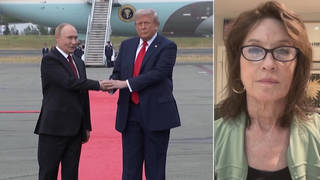
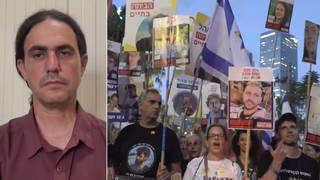
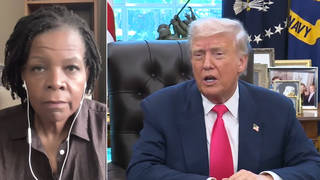
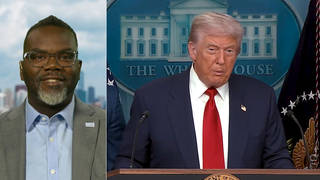





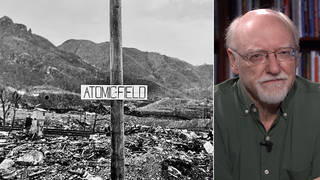
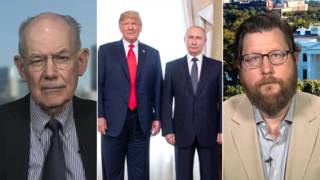
Media Options